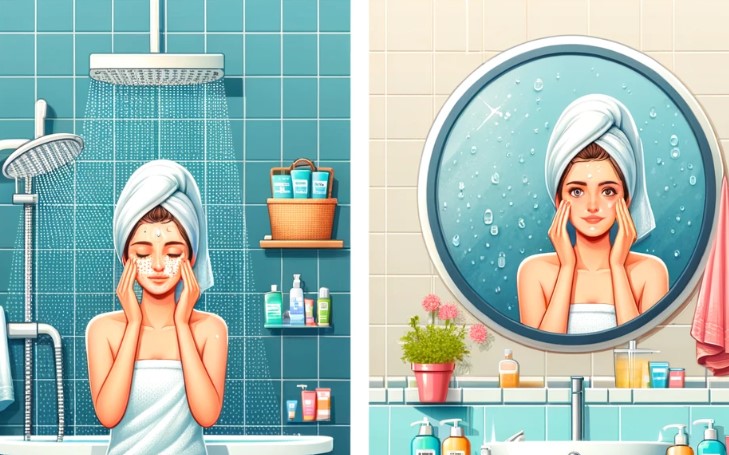Have you ever noticed a scale buildup on your faucets or felt your skin unusually dry after a shower? Chances are you’re experiencing the effects of hard water. Unlike soft water,
which is treated to remove calcium and magnesium ions, hard water contains high concentrations of these minerals. While it’s generally safe to use and consume, hard water can lead to various complications, particularly regarding skin health.
One of the lesser-discussed yet significant issues is how hard water can exacerbate skin conditions, especially acne. These minerals can clog pores and interfere with the natural oil balance on your skin, leading to increased breakouts and irritation.
Understanding hard water’s role is crucial for those struggling with acne. It’s not just about treating the acne itself but also addressing the environmental factors that contribute to it.
In this article, we delve into how hard water contributes to acne and offer practical advice on mitigating its effects. By exploring the connection between your water and skin, you can take more informed steps towards clearer, healthier skin.
Understanding the Connection Between Hard Water and Acne
Hard water is defined by its high mineral content, primarily calcium and magnesium. These minerals are naturally present in the water and picked up as they pass through limestone and chalk deposits.
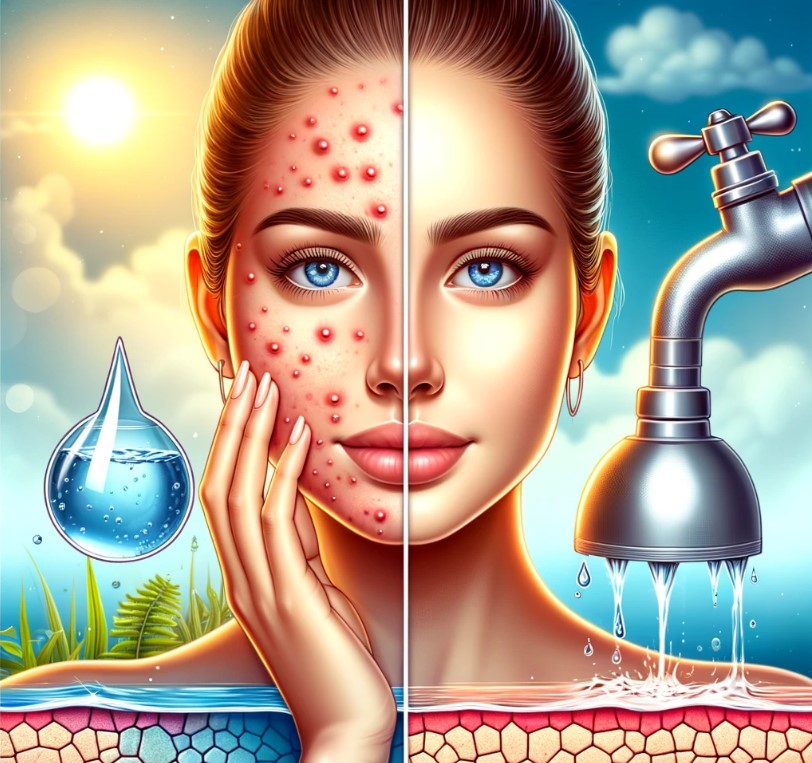
Although beneficial for bone health when ingested, these minerals can have less favourable effects when they come into contact with your skin, mainly if you are prone to acne.
When hard water is used for washing, the calcium and magnesium in it do not dissolve soap effectively, leading to a residue known as soap scum. This film can cling to the skin, clog pores and trap bacteria, exacerbating acne outbreaks.
Moreover, the minerals can precipitate onto the skin, creating a layer that can irritate the skin and disrupt the natural balance of oils. This disruption compromises the skin’s protective barrier, making it more susceptible to acne.
Statistics reveal that hard water is not a niche problem, impacting around 85% of homes in the United States. This widespread prevalence suggests that a significant number of acne sufferers could be dealing with symptoms worsened by their water supply.
Understanding this connection is critical in developing an effective skincare regimen that acknowledges and addresses the environmental factors contributing to skin health.
Symptoms of Hard Water-Induced Acne
Acne triggered or worsened by hard water often has distinctive characteristics that can help you identify if your water supply might be part of the problem. This type of acne commonly manifests in areas where water contact is most frequent or prolonged, such as the cheeks, jawline, and around the hairline.
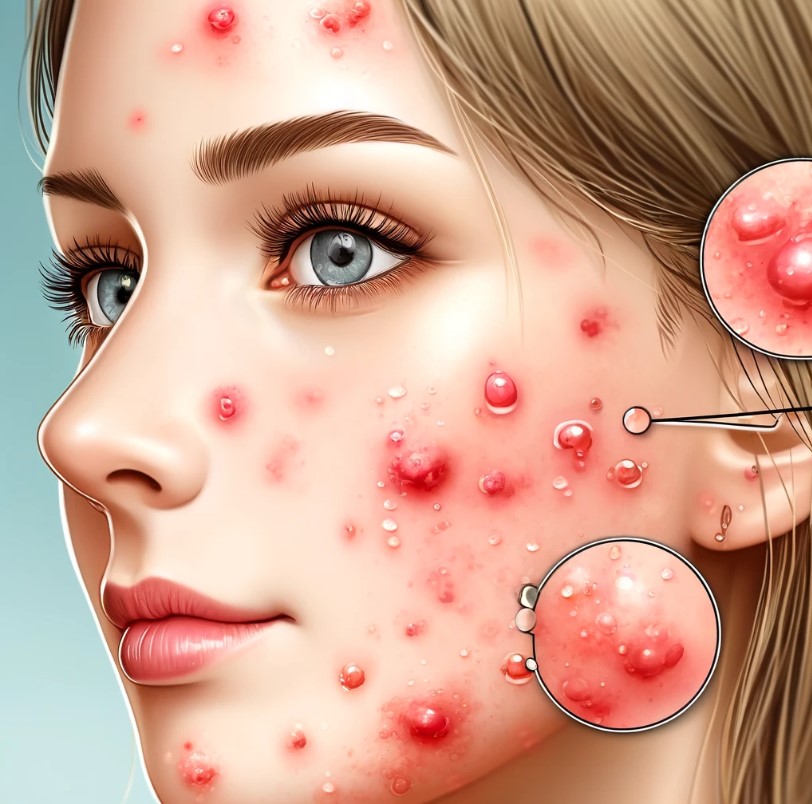
This acne often appears as small, hard bumps under the skin, which can sometimes feel rough to the touch. Unlike typical acne, which may present with more inflammation and noticeable pus-filled pimples, hard water-induced acne may persist as stubborn, non-inflammatory blemishes that are difficult to clear.
Comparing this with other types of acne, such as hormonal acne, which typically presents with deep, cystic pimples along the jawline and chin or acne caused by diet, which might be more widespread, can help identify the cause.
Another distinguishing factor is the response to traditional acne treatments. Problematic water acne might not respond well to conventional acne treatments that typically target bacterial infections and oil production; the primary issue is mineral deposits on the skin, which these treatments don’t address.
Diagnosis and Professional Insight
Diagnosing acne caused explicitly by hard water often requires a dermatologist to evaluate the skin condition and an individual’s environmental factors. Dermatologists might start with a comprehensive skin examination and review of the patient’s history to rule out other common causes of acne, such as hormonal imbalances, dietary triggers, or stress-related factors.
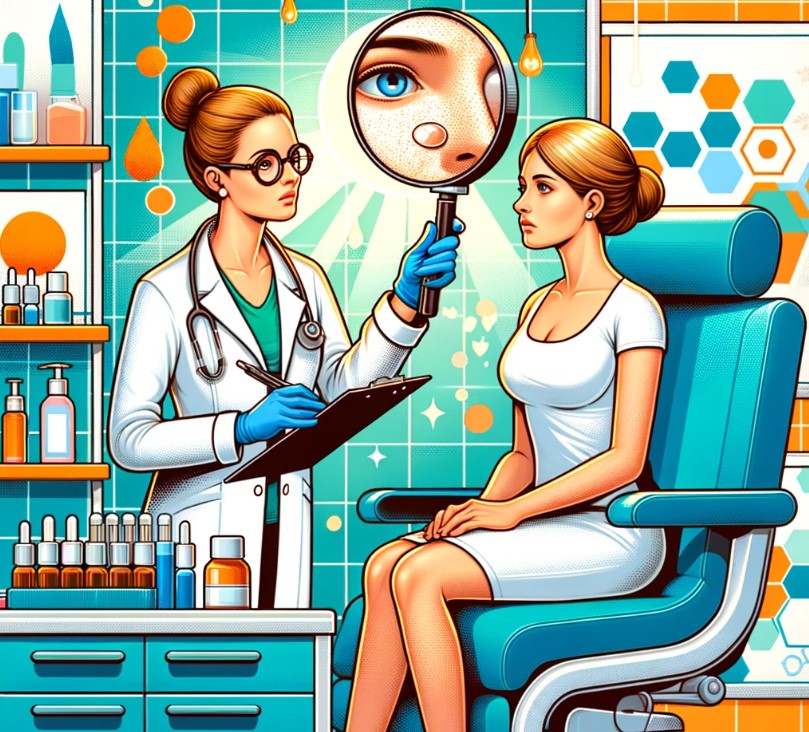
If these are not predominant, the dermatologist may inquire about the water quality in the patient’s home. This can include questions about scale buildup on fixtures, water taste, and other related issues that suggest hard water.
Further, a dermatologist may recommend testing the water hardness at the patient’s residence to confirm its mineral content. While there’s no specific test to directly link acne to hard water, the correlation can often be inferred from eliminating other causes combined with the presence of hard water and the type of skin symptoms described.
Expert opinions and studies have increasingly highlighted the link between hard water and skin issues, including eczema and acne. Research indicates that hard water can strip the skin of moisture and impair the skin barrier,
leading to dryness and irritation that can exacerbate acne. For instance, a study published in the Journal of Investigative Dermatology found that exposure to hard water can increase the skin’s sensitivity to potential irritants. This effect could also promote acne flare-ups in susceptible individuals.
Effective Home Remedies to Combat Hard Water Acne
Managing acne exacerbated by hard water involves a strategic approach to skincare that can be implemented right at home. Here are some practical remedies:
Use a Gentle Cleanser
One fundamental step is to switch to a gentle, non-comedogenic cleanser. Since hard water can prevent soap from lathering properly, resulting in soap scum, it’s crucial to use a cleanser that can effectively remove impurities without leaving residue.
Opt for a formula designed to work in challenging water conditions or a cleanser labelled “for sensitive skin,” as these are typically free from harsh chemicals and heavy fragrances that could exacerbate your skin issues.
Install a Water-Softening Shower Filter
Installing a shower filter that softens water by filtering out excess minerals can dramatically impact your skin. These filters reduce the calcium and magnesium levels in your shower water, thereby minimizing the formation of soap scum and the risk of clogged pores.
Many users notice a significant improvement in the texture and clarity of their skin after using these filters, as they help maintain the skin’s natural balance and prevent irritation.
Moisturize Effectively Post-Shower
Moisturizing immediately after showering is crucial, especially when dealing with hard water. Hard water can strip your skin of natural oils, leaving it dry and more susceptible to acne. Use a high-quality moisturizer that restores hydration and strengthens the skin barrier.
Look for products containing ingredients like hyaluronic acid, ceramides, and glycerin, known for their hydrating properties and ability to lock in moisture. Additionally, oil-free and non-comedogenic moisturizers can prevent further clogging of pores.
Advanced Skincare Tips
Enhancing your skincare regimen with targeted products and practices can make a significant difference in managing acne and maintaining healthy skin for those living in challenging water areas. Here are some advanced tips to consider:
Choosing the Right Skincare Products
When selecting skincare products, it’s crucial to consider how they will interact with hard water. Opt for non-comedogenic products, which are specifically formulated to not block pores. This feature is vital because it challenges water-clogged pores by leaving behind mineral deposits.
Additionally, while heavy moisturizers are great for providing much-needed hydration, they are also non-comedogenic. Look for ingredients like dimethicone, which provides hydration and protection without exacerbating acne.
Regular Use of Chemical Exfoliants
Integrating a chemical exfoliant into your skincare routine can be a game-changer in preventing clogged pores, a common consequence of hard water. Chemical exfoliants, such as AHAs (alpha-hydroxy acids like glycolic acid) or BHAs (beta-hydroxy acids like salicylic acid),
work by dissolving the bonds between dead skin cells, encouraging their removal and preventing them from clogging pores. Salicylic acid is particularly beneficial for acne-prone skin as it helps exfoliate the surface and penetrates the pores to remove sebum and other impurities.
To safely incorporate chemical exfoliants into your regimen:
- Start with a low concentration to gauge your skin’s tolerance.
- Use exfoliants in the evening to avoid sun sensitivity issues during the day.
- Always follow up with a broad-spectrum sunscreen in the morning, as exfoliants can make your skin more susceptible to UV damage.
Considerations for Routine Adjustment
You may need to adjust your skincare routine more frequently when dealing with hard water. If you notice increased dryness or irritation, it might be beneficial to cut back on exfoliating and instead increase hydrating serums and soothing ingredients like aloe vera or niacinamide, which calm inflammation and support the skin barrier.
Medical Treatments and Skincare Technologies
When home remedies and advanced skincare tips aren’t enough to manage acne caused by hard water, seeking medical treatments and exploring new skincare technologies can provide further relief. Here’s what dermatologists might recommend and some of the latest innovations in skincare that can help:
Medical Treatments
Dermatologists often prescribe specific treatments that target acne more aggressively than over-the-counter products. Some of the most common medical treatments include:
- Topical Retinoids: These are derivatives of Vitamin A and are highly effective in treating acne by promoting cell turnover and preventing the clogging of pores. Examples include tretinoin, adapalene, and tazarotene. Topical retinoids can also help diminish the appearance of acne scars and skin discolouration.
- Antibiotics: For moderate to severe acne, topical or oral antibiotics might be prescribed to reduce inflammation and bacteria on the skin. Common choices include clindamycin and doxycycline.
- Hormonal Treatments: Especially useful in treating acne that’s thought to be exacerbated by hormonal imbalances, treatments such as birth control pills or spironolactone can be prescribed.
- Chemical Peels: These treatments use a chemical solution to remove the outer layer of old skin, treating acne while enhancing skin texture and appearance.
Skincare Technologies
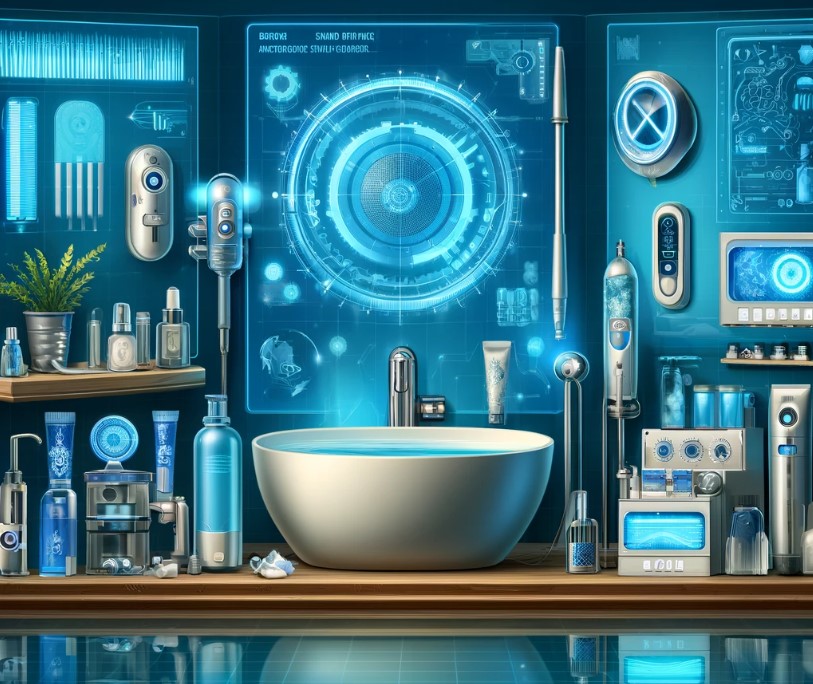
Advancements in skincare technology also offer new ways to combat the effects of hard water:
- Water Softener Systems: Installing a home water softener system is a technological solution that replaces calcium and magnesium in hard water with sodium. This not only helps reduce the incidence of acne but also benefits the skin overall by making water gentler and more compatible with soaps and cleansers.
- Ultrasonic Skin Cleansing Devices: These devices use ultrasonic waves to cleanse the pores deeply. They are particularly effective in removing the mineral deposits left by hard water and helping skincare products penetrate deeper.
- LED Light Therapy: Blue and red LED light therapy can treat acne. Blue light targets acne-causing bacteria, while red light helps reduce inflammation and promote healing.
Preventative Measures to Protect Skin from Hard Water
Living in an area with hard water requires a proactive approach to skincare to prevent the onset of issues like acne. Here are some long-term strategies and lifestyle changes that can significantly reduce hard water’s impact on your skin:
Long-Term Strategies
- Whole-House Water Softening System: Installing a whole-house water softening system is one of the most effective ways to combat the effects of hard water on your skin. These systems remove the excess minerals responsible for water hardness, such as calcium and magnesium, before the water reaches your taps. This helps prevent acne, improves the overall condition of your skin and hair, and extends the life of your plumbing and appliances.
- Point-of-Use Filters: If a whole-house system is not feasible, consider installing point-of-use filters on showerheads and taps. These filters can help reduce the hardness of water at specific outlets, ensuring that the water you use for washing your face and body is less likely to cause skin irritation.
Lifestyle Changes
- Adjust Your Skincare Routine: Regularly assess and adjust your skincare routine based on how your skin responds to the water in your area. If your skin tends to dry out, switch to more moisturizing products or use protective barriers like thicker moisturizers.
- Shower Adjustments: Lowering the temperature of your showers can help minimize the drying effect of hard water on your skin. Hot water can exacerbate the deposition of minerals on the skin, leading to more severe drying and irritation.
- Regular Cleaning: Buildup from hard water can also occur on your skin, just as it does on faucets. A gentle, exfoliating washcloth or a mild body scrub can help remove residual mineral buildup from the skin. However, be cautious not to over-exfoliate, as this can further irritate the skin.
- Stay Hydrated and Maintain a Healthy Diet: Drinking plenty of water and maintaining a balanced diet rich in antioxidants can help fortify your skin from the inside out, providing it with the nutrients it needs to combat stressors like hard water.
Navigating the challenges of hard water and its effects on skin health, particularly acne, requires a well-rounded approach that spans understanding, treatment, and prevention. We’ve explored hard water’s significant role in exacerbating skin issues due to its high mineral content,
particularly calcium and magnesium, which can disrupt your skin’s natural balance. Symptoms specific to problematic water-induced acne, such as persistent, non-inflammatory blemishes, especially around areas like the cheeks and jawline, underscore the need for targeted skincare adjustments.
To combat these effects, we discussed several effective strategies:
- Opting for gentle, non-comedogenic cleansers that combat hard water’s residue.
- Employing water-softening solutions, such as installing shower filters or whole-house systems, to reduce mineral buildup.
- Emphasizing the importance of moisturizing properly and using chemical exfoliants to maintain clear pores and a healthy skin barrier.
Furthermore, we delved into medical treatments like topical retinoids and innovative skincare technologies that can offer additional support. Preventative measures and lifestyle changes, such as adjusting your shower routine and skincare products to suit challenging water conditions, are crucial in maintaining skin health.
FAQs: How to treat acne caused by hard water?
- Q: What is hard water?
Ans: Hard water contains high levels of minerals, particularly calcium and magnesium, which can contribute to skin issues like acne. - Q: How does hard water cause acne?
Ans: The minerals in hard water can deposit on the skin, leading to clogged pores and trapping bacteria, exacerbating acne. - Q: Can changing my cleanser help with problematic water acne?
Ans: Yes, a gentle, non-comedogenic cleanser can prevent the minerals in hard water from clogging your pores. - Q: What are water-softening shower filters?
Ans: These devices can be attached to shower heads to filter out excess minerals, helping reduce the skin’s exposure to hard water. - Q: How can moisturizing help in areas with hard water?
Ans: Moisturizing helps restore the skin’s natural barrier, which can be stripped away by hard water, preventing dryness and irritation. - Q: Should I use a chemical exfoliant if I have hard water?
Ans: Regularly using chemical exfoliants like AHAs or BHAs can help remove mineral deposits and prevent pore clogging. - Q: What are some signs that my acne is caused by hard water?
Ans: Suppose acne primarily appears in areas exposed to water and is accompanied by dryness and irritation. In that case, hard water may be a contributing factor. - Q: Can installing a whole-house water softener help with skin acne?
Ans: Yes, reducing the hardness of water throughout your home can help mitigate its effects on your skin. - Q: Are there any dietary changes that can help with problematic water acne?
Ans: While nutritional changes won’t affect water hardness, staying hydrated and consuming a balanced diet can support overall skin health. - Q: When should I see a dermatologist for acne caused by hard water?
Ans: If home remedies do not improve your acne or if it worsens, consult a dermatologist for specialized treatment.

